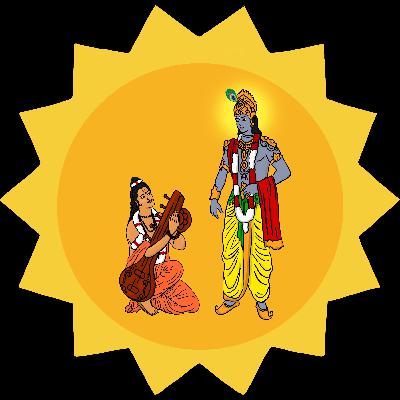Pragmatic Bhakti Sutra, Shlokas 71 - 75
Description
Shloka 71: मोदन्ते पितरो नृत्यन्ति देवताः सनाथा चेयं भूर्भवति॥ ७१॥
modante pitaro nṛtyanti devatāḥ sa-nāthā ceyaṁ bhūr-bhavati.
मोदन्ते (Modante) - Rejoice; पितरो (Pitaro) - Ancestors; नृत्यन्ति (Nrityanti) - Dance; देवताः (Devatah) - Deities; सनाथा (Sanaatha) - Protected; चेयं (Cheyam) - This; भूर्भवति (Bhoorbhavati) - Earth Becomes.
When such a pure devotee is born, their ancestors rejoice, the divine beings in heaven dance in joy and this earth itself becomes sanctified.
Such a pure devotee has such a powerful impact on everybody around them and the whole Earth. Prahalada, Mirabai, Hanuman are some of the examples of such great devotees who are cherished and revered by everybody.
It's important to note that by "ancestors," we're not just talking about a devotee's biological parents. We're talking about all the people who've tried to live a spiritual life in the past. These ancestors feel a sense of fulfillment when they see a devotee experiencing the ultimate love for Bhagavan. It's as if all their hard work and sacrifices have paid off in this one person who has found the truth.
Such a person, filled with love and truth, becomes the perfect example of what we should all aspire to be. They are the outcome of a long journey of spiritual evolution.
The Earth, in this context, is considered as the wife of Bhagavan. So, when a devotee, who is like a hero, comes to her rescue, it's like she's reunited with her Lord. This devotee stands against all the negative forces that harm the Earth and promotes a more moral, ethical, and humane way of life.
Just like waking up from a dream liberates us from its illusions, when a true devotee discovers the ultimate truth, it brings a sense of freedom to everyone around them. They constantly share their joy and understanding with others, hoping to bring light into their lives.
And that's their sole purpose - to help others see the truth and live a better life. This is what prophets, saints, and wise people have always done. They form a sort of spiritual fraternity, working together to make the world a better place.
In the Ramcharitmanas, Uttara Khanda, Lord Shiva tells Parvati:"सुनु उमा सुख भए सजजना। ते जनम कुटुम्ब जहाँ जना।।"
"Listen, Uma, blessed is the family, and happy are the good people, where a devotee of Lord Ram is born."
In this verse, Lord Shiva is emphasizing the power and glory of being a devotee of Lord Ram. According to him, the birth of such a devotee not only blesses their family but also brings happiness and honor to the world.
Shloka 72: नास्ति तेषु जातिविद्यारूपकुलधनक्रियादिभेदः॥ ७२॥
nāsti teṣu jāti-vidyā-rūpa-kula-dhana-kriyādi-bhedaḥ.
नास्ति (Nasti) - There is no; तेषु (Teshu) - Among them; जाति (Jati) - Caste; विद्या (Vidya) - Knowledge; रूप (Roop) - Beauty; कुल (Kul) - Family; धन (Dhan) - Wealth; क्रिया (Kriya) - Deeds; अदिभेदः (Adibhedah) - Etcetera differences.
Among such saints, there is no distinction based on caste, knowledge, beauty, family, wealth, deeds, and so on.
This verse emphasizes the spiritual principle that in the realm of devotion to Bhagavan, material distinctions hold no value.
Let us remind ourselves of what Shri Krishna said in the Bhagavad Gita (9.22):
अनन्याश्चिन्तयन्तो मां ये जनाः पर्युपासते |
तेषां नित्याभियुक्तानां योगक्षेमं वहाम्यहम् || 9.22 ||
ananyāś cintayanto māṁ ye janāḥ paryupāsate
teṣāṁ nityābhiyuktānāṁ yoga-kṣemaṁ vahāmy aham
To those who are constantly devoted and who worship Me with love, I give the understanding by which they can come to Me. In their hearts, I live, and from within them, I guide them.


![Pragmatic Bhakti Sutras: The Divine Intoxication: Trading Endless Desire for Eternal Joy [Sutras 6 to 8]] Pragmatic Bhakti Sutras: The Divine Intoxication: Trading Endless Desire for Eternal Joy [Sutras 6 to 8]]](https://s3.castbox.fm/9a/19/f5/ce195a14eec5a9bf8ed00161fd410c1671_scaled_v1_400.jpg)
![Pragmatic Bhakti Sutras: The Art of Fulfillment [Sutra 5] Pragmatic Bhakti Sutras: The Art of Fulfillment [Sutra 5]](https://s3.castbox.fm/f0/a6/6a/54b978ab523eb84698397a4dd18c006211_scaled_v1_400.jpg)
![Narada Bhakti Sutras: Beginning the Journey of Divine Love [1 to 4] Narada Bhakti Sutras: Beginning the Journey of Divine Love [1 to 4]](https://s3.castbox.fm/64/ce/cc/c7b8125b6af7c68e8dbcee305bed4d75c0_scaled_v1_400.jpg)





